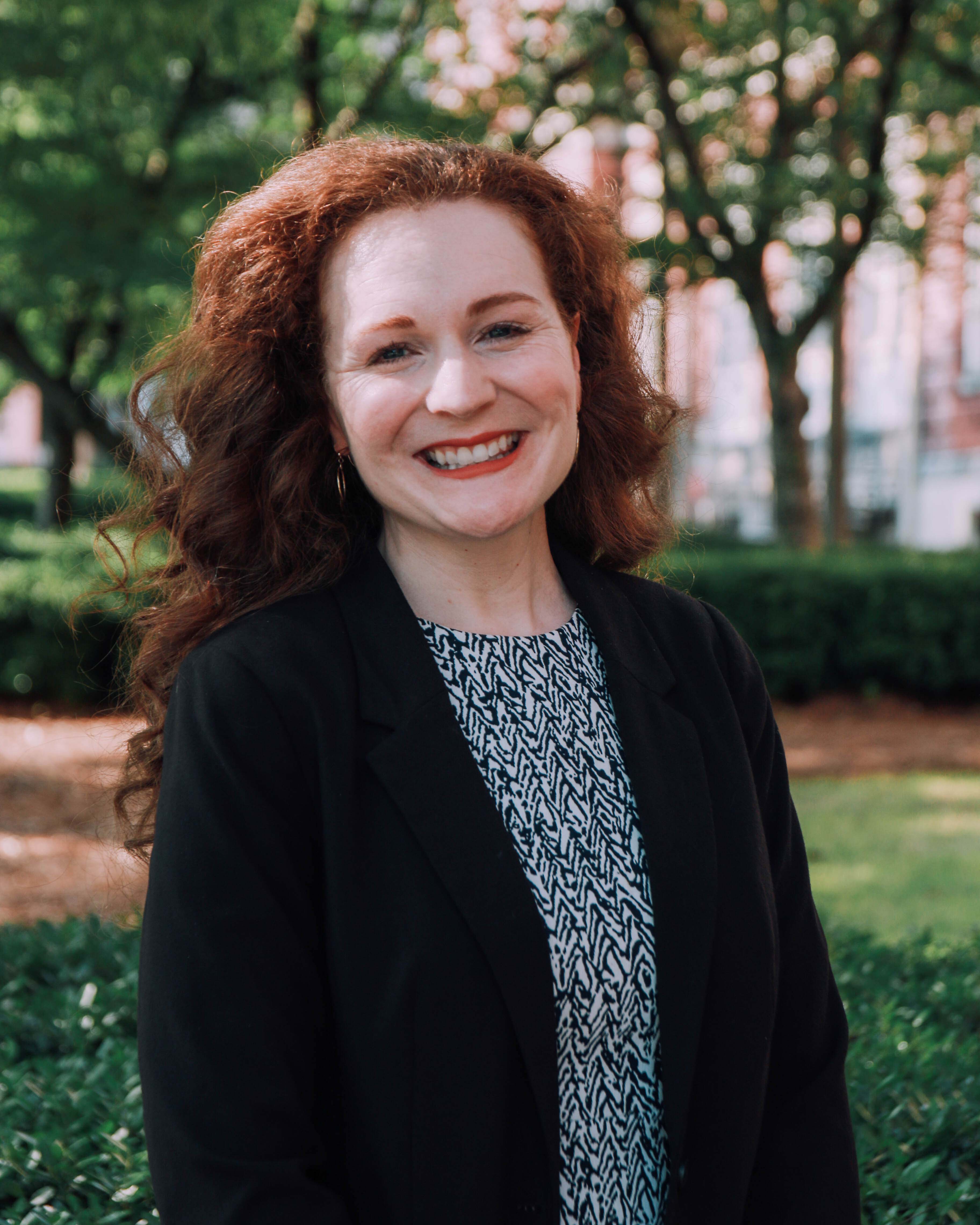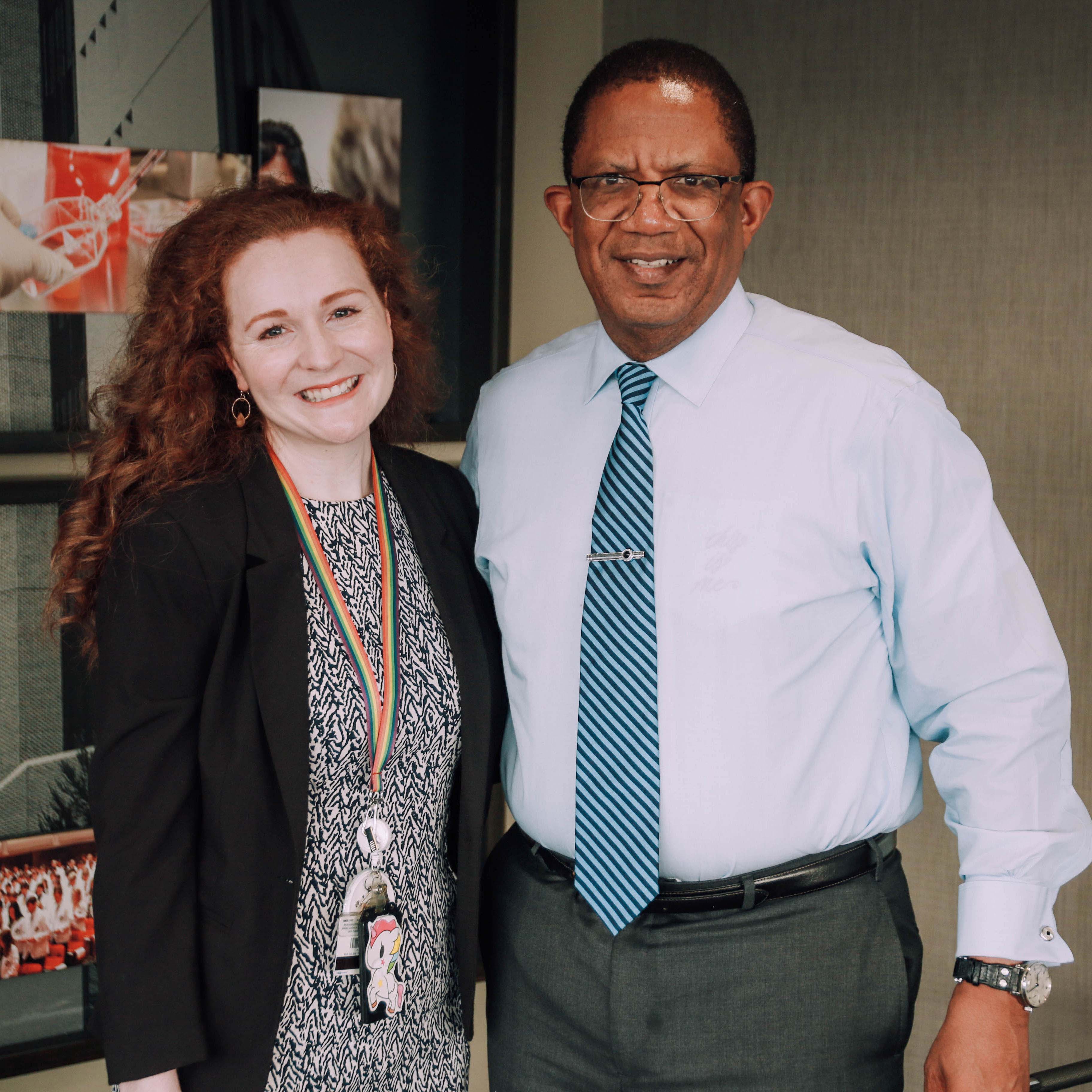 For Pride Month this June, the School of Medicine is showcasing the exceptional voices, programs, initiatives, patient care, and research committed to the well-being of the LGBTQ+ community.
For Pride Month this June, the School of Medicine is showcasing the exceptional voices, programs, initiatives, patient care, and research committed to the well-being of the LGBTQ+ community.
To begin, our communications team sat down with Stephanie Perry, M.A., practice manager in the Department of Pediatrics, to discuss cultural humility, UAB’s emphasis on diversity and inclusion for LGBTQ+ individuals, and Perry’s personal testimony.
Perry is the latest guest on the ‘The Checkup’ podcast, hosted by Selwyn M. Vickers, M.D., FACS, dean of the School of Medicine.
Pride Month as self-reflection
A native of Birmingham, Alabama, Perry says that Pride Month is a time to celebrate the lives and contributions of LGBTQ+ individuals. “It is important to celebrate, promote visibility, and make space for marginalized groups—and Pride Month is one way to do that,” she says.
But for Perry’s family, Pride Month is personal. She explains that it is not only a time for celebration, but also a time of self-reflection.
“I married my wife in 2014, at that time Marriage Equality was federally recognized, but not acknowledged in my home state of Alabama. In 2015, the U.S. Supreme Court required all states to recognize same-sex marriages. Last June, the U.S. Supreme Court ruled that it is no longer legal for employers to fire someone because of their gender identity or sexual identity. My head spins when I think how fast things have progressed for the community.” At the same time, Perry explains that there is still so much to be done.
Perry is a true UAB pipeline success. She has worked at UAB for over thirteen years and graduated from UAB with her Masters in Counseling.
Aside from her role as practice manager for the Pediatrics Primary Care Clinic, Perry also provides training sessions throughout UAB that focus on LGBTQ+ health care.
Making a difference in LGBTQ+ health care
Health and health care disparities among the LGBTQ+ population are high nationally, due to a historic lack of early curriculum training in LGBTQ+ health, discrimination in insurance coverage, low percentages of cultural competency training, and several other factors.
Perry says her passion is improving the LGBTQ+ patient experience. “Training sessions are just one-way to support and advocate for this marginalized patient population.”
“During training sessions, I do my best to approach LGBTQ+ material with a lot of humility,” she says. “I remain transparent with my audience and let them know that both research and data regarding gender identity and sexual orientation is rapidly changing. We have data today that we did not have five years ago.”
 Perry’s training sessions teach cultural humility, rather than cultural competency, because humility indicates a commitment to learning. “Often, people want training in LGBTQ + medical and mental health competency, and I understand that need, but I prefer the word humility. Competency implies a mastering of the material—that you are an ‘expert’ and know all there is to know. Humility signifies that we are committed to learning.”
Perry’s training sessions teach cultural humility, rather than cultural competency, because humility indicates a commitment to learning. “Often, people want training in LGBTQ + medical and mental health competency, and I understand that need, but I prefer the word humility. Competency implies a mastering of the material—that you are an ‘expert’ and know all there is to know. Humility signifies that we are committed to learning.”
To Perry, cultural humility means a dedication to education and an ongoing openness to new ideas and concepts, “even if those concepts challenge what we thought we knew.”
The sessions are adjusted to each particular audience. “I’ve had the opportunity to meet with medical students, residents, faculty, nurses, and counselors, as well as front line staff. We review LGBTQ+ healthcare and best practices,” she explains.
To begin her sessions, Perry takes her audience through a brief introduction of key terms and vocabulary. “We review the difference between Sex, Sexual Orientation, Gender Identity, and Gender Expression,” she notes.
Trainings typically last an hour, and there is always room for a question and answer section. Perry says she starts each session with a disclaimer: what appears as a bullet point in her Power Point, may led to a much bigger discussion, depending on the audience. To accommodate for time, Perry collaborates with other excellent trainers to offer team trainings for half a day or longer. “For example, UAB School of Medicine has a week-long LGBTQ+ Special Topics Course for medical students,” she says.
Her overarching goal is to provide helpful local and national LGBTQ + resources for healthcare staff.
Belonging to something bigger
When Perry is asked what UAB’s emphasis on diversity and inclusion means for her, she states that her employment here is the first time at a job she felt comfortable placing a picture of her family on her desk.
In the same way, she says she felt comfortable sharing her truth and experience with co-workers. “If my supervisor or colleagues asked me, ‘what are your plans for the weekend?’ I do not have to hide that part of myself. If you can imagine what that feels like—to hesitate sharing a photo or weekend plans—then you get a brief glimpse into a LGBTQ+ person’s experience. We live in a cisgender, heteronormative world. Knowing that UAB is committed to diversity, equity, and inclusion helps me (and other LGBTQ+ people) feel heard and seen.”
Perry explains that UAB was one of the first large universities in the state to include gender identity and sexual orientation in their non-discrimination policy. “For me, this meant I felt comfortable bringing my whole self to work—and ultimately my best self.”
Perry also shares that she had immediate access to a wonderful group, Alliance for LGBTQ Equality at UAB.
Fostering LGBTQ+ allyship
Perry turns to PFLAG National to discuss a few ways to support and advocate for the LGBTQ+ community. She says trying a few of these suggestions build ally skills and help create change.
Be open. Have conversations on lesbian, gay, bisexual, transgender, and queer (LGBTQ+) topics. Invite LGBTQ+ friends, family, colleagues, classmates, and acquaintances to the discussion.
Ask questions. Consider doing cultural competency research. If you hear acronyms, terminology, or references that you do not know, seek out the answers.
Stay informed. Learn about the realities, challenges, and issues impacting LGBTQ+ lives through news stories, social media, websites, books, documentaries, and educational materials.
Speak up. Say something when you hear anti-LGBTQ+ slurs, jokes, or misinformation. Lead with why you’re an ally and make your case for more welcoming and inclusive spaces.
Teach equality. Talk to the children in your life about different, varying types of families. Be mindful of the day to-day messages that they are receiving about people who are LGBTQ+ in their schools, from friends, social media, and on TV.
Show your support
As an employee, trainee, or student of the School of Medicine, several options for allyship exist. One way to show your support is to download these new gender pronoun email signatures. Asking and correctly using someone’s gender pronouns shows respect and validation. Plus, it normalizes our unique identities and breaks through stigmas related to gender.
To learn more about allyship or LGBTQ+ diversity at UAB, listen to the latest episode of 'The Checkup.'
If you are interested in a LGBTQ+ training session facilitated by Stephanie Perry for your group or unit, email sperry@peds.uab.edu to book a session.